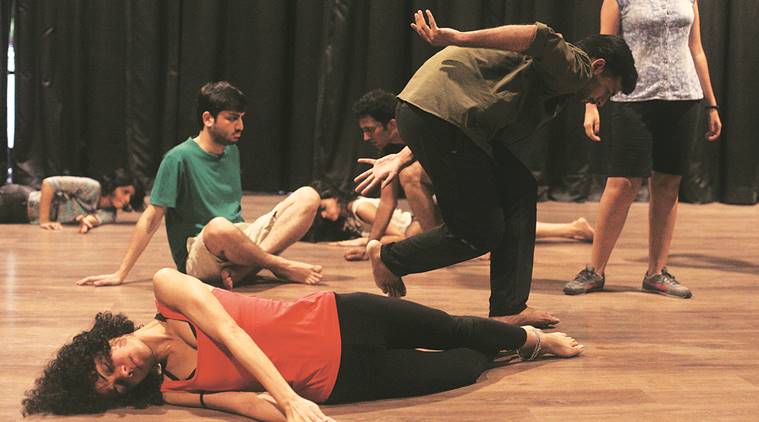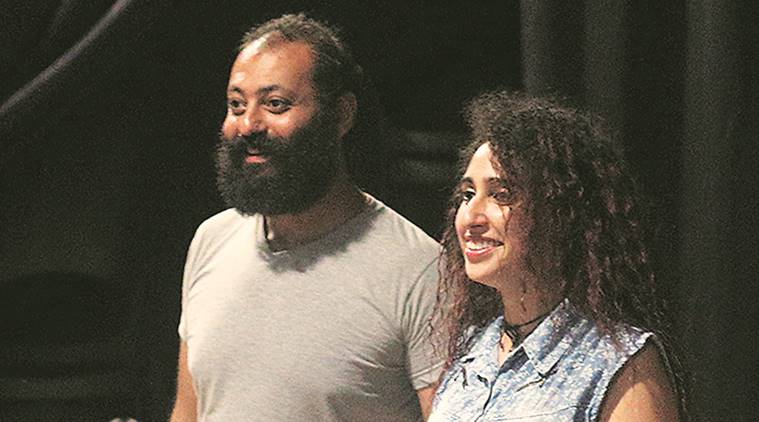Be the Clown
Stavros Kyrillos and Mawra Haiba have been taking clowning workshops in India since 2017.

Scene from the workshop (Express photo by Amit Mehra)
“The clown we do is the one that liberates you and gets your emotions out without the fear of judgement. The clown is not afraid of it,” says Stavros Kyrillos, a theatre person from Egypt, while talking about the workshops that he has been taking with Mawra Haiba, in various Indian cities since last year. The last one, six-days long, was at Delhi’s Oddbird Theatre. “We do a lot of activities that help participants connect with each other, build self-esteem and trust with others, and find their true emotion,” says Kyrillos.
He shares one activity they do. The actor has to be on stage and express different feelings — how he sees the people, and what their reflection does to him — that is essential for a clown. The duo has travelled to cities such as Bikaner, Jaipur, Udaipur, Chandigarh, Patiala and Shimla.
He shares one activity they do. The actor has to be on stage and express different feelings — how he sees the people, and what their reflection does to him — that is essential for a clown. The duo has travelled to cities such as Bikaner, Jaipur, Udaipur, Chandigarh, Patiala and Shimla.
Kyrillos says that he was handed the red nose for the first time, 10 years back, by his theatre teacher Albert Alfi. He touched it and felt a chemistry. “I found a clowning workshop in Alexandria, which was rare, and it took me to the clown world,” he says. How is the clowning world? “It’s different,” he says. “The clown is you, who you really are, behind all the masks, makeup, and protocols and laws of the community. A clown can have all kinds of emotions — sadness, anger and fear, but he is not afraid to show it.”
The duo is part of the group HsHs Clowns. “It means the feeling of crazy, not crazy,” he says. They visit orphanages, hospitals, slums, and perform on the street. “They are ones who need us. Anyone can pay and get clowns for birthday parties, but the poor can’t. The poverty after the revolution has caused them more stress. That’s why we decided to put all our force for them. We don’t speak about any subject, we just take them to another world, an imaginary world full of laughter and comedy and that really can change people, we have seen it,” he says.
The duo is part of the group HsHs Clowns. “It means the feeling of crazy, not crazy,” he says. They visit orphanages, hospitals, slums, and perform on the street. “They are ones who need us. Anyone can pay and get clowns for birthday parties, but the poor can’t. The poverty after the revolution has caused them more stress. That’s why we decided to put all our force for them. We don’t speak about any subject, we just take them to another world, an imaginary world full of laughter and comedy and that really can change people, we have seen it,” he says.
The group has also performed in war-stricken Lebanon, where they provided clown therapy to children living in prisons and refugee camps. “When we gave them twisting balloons, they turned them into guns and swords. After the show, they came and shared stories with us, and that really helps them,” he says. Kyrillos also shares how he met a 14-year-old boy, in the prison, who was not from Lebanon, Syria or Egypt. “He doesn’t know where he is from. He has grown up in different orphanages in many countries. He told me places in Egypt which I don’t know.”
The group has two self-funded events every year. The Red Nose Day, dedicated to clowning, where they have people from different communities in Egypt connect with each other with activities that include contemporary dancing, pantomiming, puppetry and comic theatre. “We make sure they are different people and how can we accept each other,” he says. The other is “Blindness of the Faces” which has expressive and experimental theatre. “It speaks about experiences of the people and those who have extreme differences like Down Syndrome, obesity, child sexual abuse or sexual orientation,” he says.
For all the latest Lifestyle News, download Indian Express App






















 Stavros Kyrillos and Mawra Haiba (Express photo by Amit Mehra)
Stavros Kyrillos and Mawra Haiba (Express photo by Amit Mehra)
No hay comentarios:
Publicar un comentario